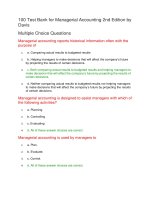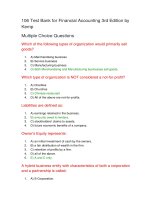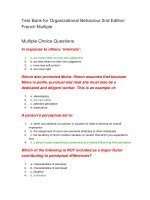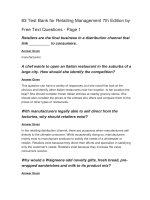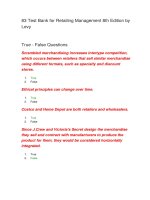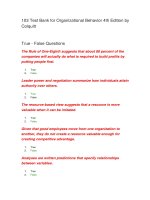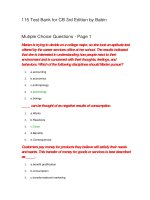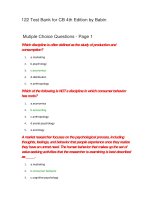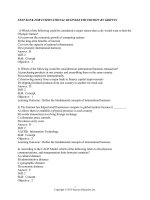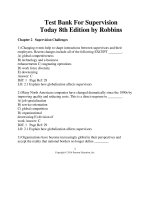83 test bank for retailing management 8th edition by levy
Bạn đang xem bản rút gọn của tài liệu. Xem và tải ngay bản đầy đủ của tài liệu tại đây (135.13 KB, 18 trang )
83 Test Bank for Retailing Management 8th Edition by
Levy
True - False Questions
Scrambled merchandising increases intertype competition,
which occurs between retailers that sell similar
merchandise using different formats, such as specialty
and discount stores.
1.
2.
True
False
Ethical principles can change over time.
1.
2.
True
False
Costco and Home Depot are both retailers and wholesalers.
1.
2.
True
False
Since J.Crew and Victoria's Secret design the merchandise
they sell and contract with manufacturers to produce
the product for them, they would be considered
horizontally integrated.
1.
2.
True
False
As part of their strategy, the supermarket chain, Whole
Foods, utilizes local producers and offers private-label
products.
1.
2.
True
False
Retailers are the final phase of a distribution channel that
link manufacturers to consumers.
1.
2.
True
False
Drycleaners, hair salons and auto repair businesses are
considered retailers.
1.
True
2.
False
There are no laws that dictate what is ethical and what is
not.
1.
2.
True
False
Food retailers experience better financial performance than
retailers that focus on hard and soft line products.
1.
2.
True
False
Free Text Questions
What are the three things identified by a retail strategy
statement?
Answer Given
(1) The target market toward which the retailer will direct its efforts, (2) the nature
of the merchandise and services the retailer will offer to satisfy the needs of the
target market, and (3) how the retailer will build a long-term advantage over its
competitors.
What is the retailer's role in a supply chain?
Answer Given
The retailer's role in the distribution channel is to link manufacturers with
consumers by directing their efforts to satisfying the needs of the ultimate
consumers.
Why would a Walgreens add novelty gifts, fresh bread, prewrapped sandwiches and milk to its product mix?
Answer Given
Walgreens is engaging in scrambled merchandising. They have added these
products; and therefore, more to appeal to a broader group of customers, while
providing one-stop shopping for a time-starved society.
Ethics in business has become increasingly important. List
four questions you can ask yourself to help assess
whether or not a behavior or activity is unethical:
Answer Given
Students may have any four of these nine type of questions: 1) Would I be
embarrassed if a customer found out about this behavior?; 2) Would my
supervisor disapprove of this behavior?; 3) Would most coworkers feel that this
behavior is unusual?; 4) Am I about to do this because I think I can get away with
it?; 5) Would I be upset if a company did this to me?; 6) Would my family or friends
think less of me if I told them about engaging in this activity?; 7) Am I concerned
about the possible consequences of this behavior?; 8) Would I be upset if this
behavior or activity was public in a newspaper article?; 9) Would society be worse
off if everyone engaged in this behavior or activity?
To compete effectively with the competition, JCPenney has
made some strategic changes. Discuss four changes
the company made and how JCPenney expects the
changes to better satisfy its target market.
Answer Given
There are many different areas the student may choose as their four: 1) JCP has
reorganized the store, catalog and Internet channels to provide a seamless
multichannel offering making transactions most convenient for their customers. 2)
JCP is reducing its distribution costs by shipping merchandise through its
distribution centers rather than using direct delivery from vendors to stores. 3) JCP
now has a centralized merchandise management. Rather than having store
managers make merchandise decisions, merchandise decisions are made by JCP
buyers in the corporate headquarters to save costs and respond quicker. 4) To
increase customer convenience, JCPenney is building new stores in free-standing
locations. 5) JCP has redesigned their stores to have centralized checkouts to
best service their customers. 6) JCP is offering more fashionable merchandise
with notable exclusive designer brands. This gives customers more exclusive and
fashionable merchandise only found at JCP.
Most retailers try to be socially responsible. Identify and
discuss the four stages companies typically go
through before they fully integrate corporate social
responsibility (CSR) into their strategy.
Answer Given
Stage 1) Engagement in activities required by the law. Companies are not usually
convinced at this stage of the importance of CSR. Stage 2) Engagement of
activities resulting in short-term financial benefits. Doing things that may be
socially responsible, but only doing them because they save the company money.
Stage 3) Companies engage in social responsibility because they believe it is the
right thing to do. Companies have in a sense, "turned the corner". Stage 4)
Companies engage in social responsibility because they believe it must be done
for the "well- being" of everyone. These companies have incorporated the concept
of CSR into every aspect of their business.
List the four functions performed by retailers.
Answer Given
The four functions performed by retailers are (1) providing an assortment of
products and services, (2) breaking bulk, (3) holding inventory, and (4) providing
services.
Distinguish between intratype competition and intertype
competition. Give an example of each.
Answer Given
Intratype competition refers to the competition between retailers with the same
format. An example would be the competition between Publix and BiLo for sale of
fresh salmon. Intertype competition refers to retailers that sell similar merchandise
using different formats. An example would be the sale of Revlon Color-Stay
Lipstick between CVS and Target.
With manufacturers legally able to sell direct from the
factories, why should retailers exist?
Answer Given
In the retailing distribution channel, there are occasions when manufacturers sell
directly to the ultimate consumer. While occasionally doing so, manufacturers
mainly exist to manufacture products to satisfy the needs of a wholesaler or
retailer. Retailers exist because they direct their efforts and specialize in satisfying
only the customer's needs. Retailers exist because they increase the value
consumers receive.
In regards to customers, what aspects do retailers need to
consider when developing a retail strategy?
Answer Given
Retailers need to understand customers and how they are changing so that they
can better satisfy their needs. Retailers need to know and understand why
customers shop, how they select stores and how they select from that store's
merchandise.
Mutiple Choice Questions - Page 1
Retailers provide important functions that increase the value
of the products and services they sell to consumers.
Which of the following does NOT include value
function created by a retailer?
1.
2.
3.
4.
5.
A. Providing an assortment of products and services
B. Reducing production costs with innovative design
C. Breaking bulk
D. Holding inventory
E. Providing services
A credit union holds and maintains detailed records of the
banking activities of its members. Each quarter, the
credit union provides its members a printout of
banking activities, information about low rate loans
and pre-owned automobiles. By contacting and telling
its members about its offers on a regular basis, the
credit union is engaging in the business function of:
1.
2.
3.
4.
5.
A. breaking bulk
B. holding inventory
C. providing assortments
D. financing
E. providing services
The Chinese distribution system:
1.
2.
3.
4.
A. has a smaller percentage of people employed in distribution than the U.S.
B. is characterized by small stores with a large wholesale industry.
C. is more efficient than the distribution system in the U.S.
D. is more similar to U.S. distribution systems than Europe's systems.
Which of the following statements about retailers holding
inventory is FALSE?
1.
2.
3.
4.
5.
A. By having inventory held in the store, consumers can hold less merchandise at
home.
B. By holding inventory, retailers can decrease the visual merchandising
expenditure.
C. Holding inventory in a store helps serve the customer's needs.
D. Retailers keep inventory so products are available when consumers want them.
E. Holding inventory reduces consumer's cost of storing products.
Why is it imperative that manufacturers like HP and Procter
and Gamble understand how retailers operate?
1.
2.
A. Manufacturers will be able to sell directly on-line.
B. Manufacturers will understand how to get their products on the shelves and
sold to the customer.
3. C. Manufacturers can better sell merchandise without retailers.
4. D. Retailers can expect fewer buyouts to occur.
5. E. Manufacturers can limit multi-channel integration.
The competition between the same types of retailers is
called:
1.
2.
3.
4.
5.
A. intertype competition
B. indirect competition
C. intratype competition
D. scrambled merchandising
E. vertical integration
Providing assortments is an advantageous business activity
because:
1.
2.
3.
4.
5.
A. it enables the company to create a more informational and entertaining
environment that would promote more sales.
B. it enables the company to reinvest for the future of the business.
C. it enables the customer to choose from a wide selection of brands, designs,
sizes and prices all in one store.
D. it enables the customer to try more products.
E. it enables the customer to stock up on the assortments because of bulk
availability.
When Austin saw pastries and coffee being sold at his local
bookstore, he knew it was an example of _________,
which is the juxtaposition of unrelated merchandise in
the store.
1.
2.
3.
4.
5.
A. scrambled merchandising
B. intratype competition
C. product diversification
D. channel conflict
E. vertical differentiation
Which of the following is NOT TRUE in describing
distribution systems within major international
markets?
1.
A.The U.S. distribution system has the greatest retail density and the greatest
concentration of large retail firms.
2.
B. The Indian distribution systems are characterized by small stores operated by
small firms and a large independent wholesale industry.
3. C. In the Chinese distribution system, the merchandise often passes through
several levels of distribution to make the daily deliveries to the small retailers
efficient.
4. D. Northern European retailing is similar to efficient distribution systems in the U.S.
5. E. With the population density in France, most stores throughout France are open
24 hours 7 days a week.
What is retailing?
1.
2.
A. It is the merchandising component of the retail mix.
B.It is the set of business activities that adds value to the products and services
sold to consumers for their personal use.
3. C. It is the strategy retailers and vendors use to get products into the stores.
4. D. It is the process of offering products in smaller quantities for consumer
consumption patterns.
5. E. It is the ability to offer enough variety in a store to encourage one-stop
shopping.
Victoria's Secret, a popular retail chain in women's lingerie
and perfume, designs the merchandise they sell, and
then contracts with manufacturers to produce it
exclusively for them. Victoria's Secret is practicing:
1.
2.
3.
4.
5.
A. globalization
B. product-related marketing
C. vertical integration
D. horizontal integration
E. product diversification
If a chain of florist shops opened a plant nursery to provide
gift plants and cut flowers to all of its stores within a
300-mile radius, the chain would be practicing
1.
2.
3.
4.
5.
A. vertical integration.
B. channel expansion.
C. horizontal expansion.
D. opportunity incrementing.
E. service marketing.
A retailer's role in a supply chain is to:
1.
2.
3.
4.
5.
A. act as the liaison between manufacturers and wholesalers
B. buy merchandise exclusively from the manufacturers
C. negotiate with manufacturers to eliminate a wholesaler
D. satisfy the needs of the consumers
E. sell to wholesalers
The offering of merchandise NOT typically associated with
the store type is called:
1.
2.
3.
4.
5.
A. scrambled merchandising.
B. intratype competition.
C. product diversification.
D. channel conflict.
E. vertical differentiation.
Grocers purchase pineapples from several different tropical
countries. When pineapples arrive in the distribution
centers across the United States, containers are
reduced to amounts that are appropriate for store
delivery. Once delivered to the stores, associates open
the cartons and arrange the pineapples for the
consumer to select. Grocers are performing what
function?
1.
2.
3.
4.
5.
A. adaptive selling
B. breaking bulk
C. acclimating
D. distribution
E. transferring
When the specialty store Hollister designs and develops
merchandise as well as sells the merchandise in their
stores, _________ is occurring.
1.
2.
3.
4.
5.
A. vertical integration
B. globalization
C. product-related marketing
D. horizontal integration
E. forward integration
One of the functions retailers undertake to increase the
customer's perception of value is providing services.
Which of the following is NOT an example of that
activity?
1.
2.
3.
4.
5.
A. clean restrooms
B. displaying merchandise
C. having trained salespeople available to answer questions
D. parking lot with a lot of lighting
E. having crisp dollar bills for change
Macy's, JCPenney and Nordstrom engage in ___________
competition.
1.
2.
3.
4.
5.
A. indirect
B. intratype
C. intertype
D. vertical
E. horizontal
Nike selling products to sporting goods retailers plus having
their own Nike Town store, _________ is occurring.
1.
2.
3.
4.
5.
A. forward integration
B. vertical integration
C. backward integration
D. horizontal integration
E. cross-selling
Which of the following businesses would NOT be considered
a retailer?
1.
2.
3.
4.
5.
A. a hot dog cart at the Highland Games
B. Delta Airlines
C. University bookstore
D. Priceline.com
E. Procter and Gamble
Dillards sells Godiva chocolates and coffees in their stores.
By selling such products, Dillards is:
1.
2.
3.
4.
5.
A. offering a good merchandise mix.
B. offering what the market demands.
C. offering deep product assortments.
D. practicing scrambled merchandising.
E. practicing intratype competition.
_______________ occurs when a manufacturer undertakes
retailing activities.
1.
2.
3.
4.
5.
A. Globalization
B. Product-related marketing
C. Backward integration
D. Horizontal integration
E. Forward integration
A _____________ is a set of businesses that move products
from the point of production to the point of sale to the
ultimate consumer.
1.
A. manufacturers group
2.
3.
4.
5.
B. wholesaler network
C. retailer
D. supply chain
E. distributor
A(n) ______________ is a set of firms that make and deliver a
given set of goods and services to the ultimate
consumer.
1.
2.
3.
4.
5.
A. supply chain
B. buying network
C. trade association
D. integrated wholesale network
E. network
CVS, Walgreens and Rite Aid are _________ competitors.
1.
2.
3.
4.
5.
A. indirect
B. intratype
C. intertype
D. vertical
E. horizontal
Retailing is one of the nation's largest industries in terms of:
1.
2.
3.
4.
5.
A. community involvement
B. employment
C. competition
D. promotions
E. variety
Why is it advantageous for retailers to be vertically
integrated?
1.
2.
A. Retailers have the greatest control over its supply chain.
B.Retailers can expand their services easily to the Internet because they can
direct orders to the manufacturer.
3. C. Retailers have realized that to stay competitive, they must become vertically
integrated.
4. D. Customers prefer retailers who are vertically integrated.
5. E. There is no advantage to being vertically integrated.
A ______________ is a business that sells products and/or
services to consumers for their personal or family
use.
1.
2.
3.
4.
A. manufacturer
B. wholesaler
C. retailer
D. distributor
5.
E. None of the above
__________________ arises when a retailer performs some
distribution and manufacturing activities, such as
operating warehouses or designing private-label
merchandise.
1.
2.
3.
4.
5.
A. Globalization
B. Product-related marketing
C. Backward integration
D. Horizontal integration
E. Forward integration
A retailer that is vertically integrated:
1.
2.
3.
4.
A. concentrates on selling to businesses only
B. does not have frequent communication between buyers and managers
C. has an excellent vertical relationship between corporate and stores
D. performs more than one function in the chain from manufacturing to sales to
end user
5. E. performs only the function to serve the end user
When considering the largest retailers worldwide,
___________ retailers continue to dominate among
them.
1.
2.
3.
4.
5.
A. food
B. apparel
C. drug
D. home-improvement
E. Internet
Which of the following statements about the U.S. distribution
system is TRUE?
1.
2.
A. Many people think the United States is under-stored.
B. Many U.S. retailers are large enough to have their own warehouses and have
eliminated their need for wholesalers.
3. C. When compared to retail density in Europe, the United States is very low.
4. D. The small specialty store is the fastest growing type of U.S. retailer.
5. E. Most U.S. retail stores are less than 20,000 square feet.
______________ is when a firm performs more than one set
of activities in a marketing channel or supply chain.
1.
2.
3.
4.
5.
A. Channel diversification
B. Horizontal development
C. Horizontal integration
D. Vertical development
E. Vertical integration
64 Free Test Bank for Retailing Management 8th
Edition by Levy Mutiple Choice Questions - Page
2
While vacationing at the beach, Delia was delighted to see
that the local Walgreens carried milk, bread,apples and
bananas. Walgreens is exhibiting:
1.
2.
3.
4.
5.
A. a deep product assortment.
B. an acceptable merchandising mix.
C. a retail mix.
D. scrambled merchandising.
E. this type of intratype competition.
Ingvar Kamprad, the founder of the Swedish-based home
furnishing retail chain, IKEA, discovered in his youth
that he could make a profit by buying in bulk and
selling the items individually at a low price. This
concept is one of the activities retailers do:
1.
2.
3.
4.
5.
A. to create value.
B. for integration.
C. to display corporate social responsibility.
D. to create a retail mix.
E. to be ethical.
The ______________ identifies the target market, the
merchandise and services that will be offered, and how
the company will be competitive long-term.
1.
2.
3.
4.
5.
A. retail strategy
B. corporate sustainability
C. retail mix
D. supply chain
E. retail integration
Which of the following is NOT an element in the retail mix?
1.
2.
3.
4.
5.
A. competitive response
B. merchandise assortments
C. location
D. customer service
E. advertising and promotion
Early in JCPenney's history, store managers determined the
type of merchandise sold, the price of the
merchandise, the promotion of the merchandise and
the management of the store employees. This
describes an organizational structure that is
_______________.
1.
2.
3.
4.
5.
A. centralized
B. decentralized
C. integrated
D. disengaged
E. incorporated
To implement a retail strategy, a retailer must develop a
_____ that satisfies the needs of its target market
better than its competitors.
1.
2.
3.
4.
5.
A. production orientation
B. horizontal integration
C. sales orientation
D. retail mix
E. situation analysis
When developing the _________________ for his new barber
shop, Theo decided to obtain a long-term competitive
advantage over other salons by offering longer hours,
better prices, a well trained staff and half-price perm
day every Wednesday to attract customers.
1.
2.
3.
4.
5.
A. selling concept
B. business cycle
C. retail strategy
D. focal point orientation
E. marketing concept
Which of the following strategies has JCPenney
implemented to compete effectively with the
competition?
1.
2.
3.
4.
A. Reorganized with a decentralized merchandise management now in place.
B. Reorganized and streamlined its multichannel offerings.
C. Redesigned the stores to offer more checkouts within each department.
D. Developed a faster vendor to floor strategy by drop shipping merchandise
directly to each store.
5. E. Upgraded merchandise offering with the addition of France's cosmetics line,
Lancôme.
_______________ describes the voluntary actions taken by a
company to address the ethical, social, and
environmental impacts of its business operations and
the concerns of its stakeholders.
1.
2.
3.
4.
5.
A. Forward integration
B. Corporate social responsibility
C. Investor response
D. Competitive reactions
E. Multi-attribute engagements
Best Buy purchases many of the DVDs, Wii games, and
players by the truckload then sells them in smaller
quantities to its stores where consumers are allowed
to buy them individually. What business function is
Best Buy performing?
1.
2.
3.
4.
A. Providing assortments
B. Breaking bulk
C. Holding inventory
D. Providing services
A retailer's primary competitors are other retailers that
__________.
1.
2.
3.
4.
A. are next to or adjacent to the store location
B. use the same type of store format
C. have the same target market
D. sell online
The combination of factors retailers use to satisfy customer
needs and influence their purchase decisions is called
the firm's:
1.
2.
3.
4.
A. retailing conglomerate.
B. retail mix.
C. marketing strategy.
D. target group.
Once a retailer understands its environment, it needs to
develop and implement a:
1.
2.
3.
4.
5.
A. viable customer base.
B. advertising plan.
C. retail strategy.
D. competitive strategy.
E. functional strategy.
_________ are the principles governing the behavior of
individuals and companies.
1.
2.
3.
4.
5.
A. Ethics
B. Retail strategies
C. Training guidelines
D. Company traditions
E. Civil Rights Act of 1964
A retailer that asks their customers to bring their own
shopping bags or charges 5ಿಿ
ಿ per bag, but does not
ಿ
ಿ
engage in any other corporate social responsibilities
unless required by law, would be considered in what
stage in their strategy?
1.
2.
3.
4.
5.
A. Initial stage
B. Second stage
C. Tertiary stage
D. Fourth stage
E. Acquisition stage
Scrambled merchandising increases:
1.
2.
3.
4.
5.
A. vertical integration.
B. intertype competition.
C. concentric diversification.
D. horizontal integration.
E. intratype competition.
Since convenience of location is important in store choice, a
store's proximity to other retailers is a critical factor in
identifying:
1.
2.
3.
4.
5.
A. competition.
B. ethical standards.
C. real estate negotiations.
D. the target market.
E. which merchandise to scramble.
One of the value-providing activities that retailers perform is
_____________ where products will be available when
consumers want them.
1.
2.
3.
4.
5.
A. breaking bulk
B. holding inventory
C. production runs
D. possession stock
E. acquisition space
Initially, Anita Roddick, the founder of The Body Shop,
recycled bottles to save money when the company
was in its infancy. What stage would this be
considered in terms of Corporate Social Responsibility
in their strategy?
1.
2.
3.
4.
5.
A. Initial stage
B. Second stage
C. Tertiary stage
D. Fourth stage
E. Acquisition stage
Retailers that are building LEED-certified stores would be
considered in what stage in their strategy?
1.
2.
3.
4.
5.
A. Initial stage
B. Second stage
C. Tertiary stage
D. Fourth stage
E. Acquisition stage
A company that is in the second stage of corporate social
responsibility:
1.
2.
3.
4.
A. only engages in CSR activities that are required of them by law.
B. engages in CSR activities that provide a short-term financial benefit.
C. engages in CSR activities because they believe it is the right thing to do.
D. engages in CSR activities for the well being of everyone.
The retail strategy helps a retailer to identify the following
EXCEPT:
1.
2.
A. The target market toward which the retailer will direct its efforts.
B.The nature of the merchandise and services the retailer will offer to satisfy the
needs of the target market.
3. C. How the retailer will build a long-term advantage over its competitors.
4. D. Determine the break-even point for making profits.
What percent does the total gross domestic product come
from retailing?
1.
2.
3.
4.
A. 2%
B. 8%
C. 17%
D. 25%
Once a well-articulated retail strategy has been developed,
the next step is to:
1.
2.
3.
4.
5.
A. override the control mechanism.
B. evaluate the results of the strategy.
C. forecast future environmental trends.
D. confirm that environmental conditions have not changed.
E. implement the strategy.
As the owner of a store specializing in men's suits, Isabella
can use a retail strategy statement to identify all of the
following EXCEPT:
1.
2.
3.
4.
5.
A. the advertising campaign developed to sell last season's merchandise.
B. the store's target market.
C. how the store will build a competitive advantage over other similar retailers.
D. what services the store will offer its customers.
E. what types of suits the store will stock.
The retail activity that is particularly important to consumers
with small living quarters is who only buy what they
need at the time they need it:
1.
2.
3.
4.
A. providing assortments
B. breaking bulk
C. holding inventory
D. providing services
Approximately what percent of working people are employed
in the retail industry?
1.
2.
3.
4.
A. 5%
B. 20%
C. 35%
D. 55%
The intensity of competition is greatest among retailers
when:
1.
2.
3.
4.
5.
A. price dominates the retail mix.
B. they are located near each other and offer similar retail offerings.
C. they are located near each other and have different target customers.
D. they are located far from each other and offer similar retail offerings.
E. they are located far from each other and target the same customer.
Which of the following would NOT BE an example of
intertype competition?
1.
A. A supermarket and a fresh flower stand.
2.
3.
4.
5.
B. A Starbuck's coffee store and a fast food restaurant.
C. A supercenter and a pharmacy.
D. An American Eagle store and a Macy's store.
E. A Target store and a Walmart store.
Increasing intertype competition has made it harder for
retailers to identify their:
1.
2.
3.
4.
5.
A. competition.
B. target market.
C. merchandise mix.
D. retail mix.
E. price points.
The Aeropostale website, the Hollister mall store, and
Victoria Secret's PINK pop-up shop are all in
____________ competition.
1.
2.
3.
4.
5.
A. channel
B. horizontal
C. indirect
D. intertype
E. intratype
